#include <stdio.h>#include <string.h>#include "utility/utility.h"
Go to the source code of this file.
Defines | |
| #define | BUFMAX 400 |
| #define | NUMREGS 16 |
| #define | NUMREGBYTES (NUMREGS * 4) |
| #define | STACKSIZE 10000 |
| #define | SAVE_REGISTERS1() |
| #define | SAVE_ERRCODE() |
| #define | SAVE_REGISTERS2() |
| #define | CHECK_FAULT() |
| #define | CALL_HOOK() asm("call _remcomHandler"); |
| #define | BREAKPOINT() asm(" int $3"); |
Enumerations | |
| enum | regnames { EAX, ECX, EDX, EBX, ESP, EBP, ESI, EDI, PC, PS, CS, SS, DS, ES, FS, GS } |
Functions | |
| void | putDebugChar () |
| int | getDebugChar () |
| void | exceptionHandler () |
| void | return_to_prog () |
| asm (".text") | |
| asm (".globl _return_to_prog") | |
| asm ("_return_to_prog:") | |
| asm (" movw _registers+44, %ss") | |
| asm (" movl _registers+16, %esp") | |
| asm (" movl _registers+4, %ecx") | |
| asm (" movl _registers+8, %edx") | |
| asm (" movl _registers+12, %ebx") | |
| asm (" movl _registers+20, %ebp") | |
| asm (" movl _registers+24, %esi") | |
| asm (" movl _registers+28, %edi") | |
| asm (" movw _registers+48, %ds") | |
| asm (" movw _registers+52, %es") | |
| asm (" movw _registers+56, %fs") | |
| asm (" movw _registers+60, %gs") | |
| asm (" movl _registers+36, %eax") | |
| asm (" pushl %eax") | |
| asm (" movl _registers, %eax") | |
| asm ("ret") | |
| asm (" iret") | |
| asm ("mem_fault:") | |
| asm (" popl %eax") | |
| asm (" movl %eax, _gdb_i386errcode") | |
| asm (" popl %ecx") | |
| asm (" popl %edx") | |
| asm (" leave") | |
| asm (" pushl %edx") | |
| asm (" pushl %ecx") | |
| asm (" movl $0, %eax") | |
| asm (" movl %eax, _mem_fault_routine") | |
| asm ("iret") | |
| void | _catchException3 () |
| asm (".globl __catchException3") | |
| asm ("__catchException3:") | |
| asm ("pushl $3") | |
| void | _catchException1 () |
| asm (".globl __catchException1") | |
| asm ("__catchException1:") | |
| asm ("pushl $1") | |
| void | _catchException0 () |
| asm (".globl __catchException0") | |
| asm ("__catchException0:") | |
| asm ("pushl $0") | |
| void | _catchException4 () |
| asm (".globl __catchException4") | |
| asm ("__catchException4:") | |
| asm ("pushl $4") | |
| void | _catchException5 () |
| asm (".globl __catchException5") | |
| asm ("__catchException5:") | |
| asm ("pushl $5") | |
| void | _catchException6 () |
| asm (".globl __catchException6") | |
| asm ("__catchException6:") | |
| asm ("pushl $6") | |
| void | _catchException7 () |
| asm (".globl __catchException7") | |
| asm ("__catchException7:") | |
| asm ("pushl $7") | |
| void | _catchException8 () |
| asm (".globl __catchException8") | |
| asm ("__catchException8:") | |
| asm ("pushl $8") | |
| void | _catchException9 () |
| asm (".globl __catchException9") | |
| asm ("__catchException9:") | |
| asm ("pushl $9") | |
| void | _catchException10 () |
| asm (".globl __catchException10") | |
| asm ("__catchException10:") | |
| asm ("pushl $10") | |
| void | _catchException12 () |
| asm (".globl __catchException12") | |
| asm ("__catchException12:") | |
| asm ("pushl $12") | |
| void | _catchException16 () |
| asm (".globl __catchException16") | |
| asm ("__catchException16:") | |
| asm ("pushl $16") | |
| void | _catchException13 () |
| asm (".globl __catchException13") | |
| asm ("__catchException13:") | |
| asm ("pushl $13") | |
| void | _catchException11 () |
| asm (".globl __catchException11") | |
| asm ("__catchException11:") | |
| asm ("pushl $11") | |
| void | _catchException14 () |
| asm (".globl __catchException14") | |
| asm ("__catchException14:") | |
| asm ("pushl $14") | |
| asm ("_remcomHandler:") | |
| asm (" movl _stackPtr, %esp") | |
| asm (" call _handle_exception") | |
| void | _returnFromException () |
| int | hex (char ch) |
| char * | getpacket (void) |
| void | putpacket (char *buffer) |
| void | debug_error (char *format) |
| void | set_mem_err (void) |
| int | get_char (char *addr) |
| void | set_char (char *addr, int val) |
| char * | mem2hex (char *mem, char *buf, int count, int may_fault) |
| char * | hex2mem (char *buf, char *mem, int count, int may_fault) |
| int | computeSignal (int exceptionVector) |
| int | hexToInt (char **ptr, int *intValue) |
| void | handle_exception (int exceptionVector) |
| void | set_debug_traps (void) |
| void | breakpoint (void) |
Variables | |
| int | remote_debug |
| int | registers [NUMREGS] |
| int | remcomStack [STACKSIZE/sizeof(int)] |
| int | gdb_i386errcode |
| int | gdb_i386vector = -1 |
Define Documentation
| #define BREAKPOINT | ( | ) | asm(" int $3"); |
Definition at line 456 of file i386-stub-win32.c.
Referenced by breakpoint(), and handle_exception().
| #define BUFMAX 400 |
Definition at line 109 of file i386-stub-win32.c.
Referenced by getpacket(), and handle_exception().
| CALL_HOOK | ( | ) | asm("call _remcomHandler"); |
Definition at line 260 of file i386-stub-win32.c.
| CHECK_FAULT | ( | ) |
asm ("cmpl $0, _mem_fault_routine"); \ asm ("jne mem_fault");
Definition at line 225 of file i386-stub-win32.c.
| #define NUMREGBYTES (NUMREGS * 4) |
Definition at line 122 of file i386-stub-win32.c.
Referenced by handle_exception().
| #define NUMREGS 16 |
Definition at line 119 of file i386-stub-win32.c.
Referenced by handle_exception().
| SAVE_ERRCODE | ( | ) |
asm ("popl %ebx"); \ asm ("movl %ebx, _gdb_i386errcode");
Definition at line 208 of file i386-stub-win32.c.
| SAVE_REGISTERS1 | ( | ) |
asm ("movl %eax, _registers"); \ asm ("movl %ecx, _registers+4"); \ asm ("movl %edx, _registers+8"); \ asm ("movl %ebx, _registers+12"); \ asm ("movl %ebp, _registers+20"); \ asm ("movl %esi, _registers+24"); \ asm ("movl %edi, _registers+28"); \ asm ("movw $0, %ax"); \ asm ("movw %ds, _registers+48"); \ asm ("movw %ax, _registers+50"); \ asm ("movw %es, _registers+52"); \ asm ("movw %ax, _registers+54"); \ asm ("movw %fs, _registers+56"); \ asm ("movw %ax, _registers+58"); \ asm ("movw %gs, _registers+60"); \ asm ("movw %ax, _registers+62");
Definition at line 191 of file i386-stub-win32.c.
| SAVE_REGISTERS2 | ( | ) |
asm ("popl %ebx"); /* old eip */ \ asm ("movl %ebx, _registers+32"); \ asm ("popl %ebx"); /* old cs */ \ asm ("movl %ebx, _registers+40"); \ asm ("movw %ax, _registers+42"); \ asm ("popl %ebx"); /* old eflags */ \ asm ("movl %ebx, _registers+36"); \ /* Now that we've done the pops, we can save the stack pointer."); */ \ asm ("movw %ss, _registers+44"); \ asm ("movw %ax, _registers+46"); \ asm ("movl %esp, _registers+16");
Definition at line 211 of file i386-stub-win32.c.
| #define STACKSIZE 10000 |
Definition at line 136 of file i386-stub-win32.c.
Referenced by set_debug_traps().
Enumeration Type Documentation
| enum regnames |
Function Documentation
| void _catchException0 | ( | ) |
| void _catchException1 | ( | ) |
| void _catchException10 | ( | ) |
| void _catchException11 | ( | ) |
| void _catchException12 | ( | ) |
| void _catchException13 | ( | ) |
| void _catchException14 | ( | ) |
| void _catchException16 | ( | ) |
| void _catchException3 | ( | ) |
| void _catchException4 | ( | ) |
| void _catchException5 | ( | ) |
| void _catchException6 | ( | ) |
| void _catchException7 | ( | ) |
| void _catchException8 | ( | ) |
| void _catchException9 | ( | ) |
| void _returnFromException | ( | ) |
Definition at line 445 of file i386-stub-win32.c.
References return_to_prog().
Referenced by handle_exception().
{
return_to_prog ();
}


| asm | ( | " call _handle_exception" | ) |
| asm | ( | " movw _registers+ | 48, |
| %ds" | |||
| ) |
| asm | ( | " pushl %ecx" | ) |
| asm | ( | "pushl $14" | ) |
| asm | ( | "__catchException14:" | ) |
| asm | ( | ".globl __catchException14" | ) |
| asm | ( | ".globl __catchException8" | ) |
| asm | ( | "pushl $11" | ) |
| asm | ( | "__catchException11:" | ) |
| asm | ( | ".globl __catchException11" | ) |
| asm | ( | " movl $ | 0, |
| %eax" | |||
| ) |
| asm | ( | "pushl $13" | ) |
| asm | ( | "__catchException13:" | ) |
| asm | ( | ".globl __catchException13" | ) |
| asm | ( | "__catchException8:" | ) |
| asm | ( | "pushl $16" | ) |
| asm | ( | "__catchException16:" | ) |
| asm | ( | "pushl $8" | ) |
| asm | ( | " movw _registers+ | 44, |
| %ss" | |||
| ) |
| asm | ( | "pushl $12" | ) |
| asm | ( | "__catchException12:" | ) |
| asm | ( | ".globl __catchException12" | ) |
| asm | ( | " movw _registers+ | 52, |
| %es" | |||
| ) |
| asm | ( | "pushl $10" | ) |
| asm | ( | "__catchException10:" | ) |
| asm | ( | " movl % | eax, |
| _mem_fault_routine" | |||
| ) |
| asm | ( | ".globl __catchException9" | ) |
| asm | ( | "iret" | ) |
| asm | ( | "__catchException9:" | ) |
| asm | ( | "pushl $9" | ) |
| asm | ( | " movl _registers+ | 16, |
| %esp" | |||
| ) |
| asm | ( | " movw _registers+ | 56, |
| %fs" | |||
| ) |
| asm | ( | ".globl __catchException10" | ) |
| asm | ( | ".globl __catchException3" | ) |
| asm | ( | " movw _registers+ | 60, |
| %gs" | |||
| ) |
| asm | ( | "pushl $7" | ) |
| asm | ( | "__catchException7:" | ) |
| asm | ( | ".globl __catchException7" | ) |
| asm | ( | "__catchException3:" | ) |
| asm | ( | "pushl $6" | ) |
| asm | ( | "__catchException6:" | ) |
| asm | ( | ".globl __catchException6" | ) |
| asm | ( | "pushl $3" | ) |
| asm | ( | "pushl $5" | ) |
| asm | ( | "__catchException5:" | ) |
| asm | ( | ".globl __catchException5" | ) |
| asm | ( | " popl %eax" | ) |
| asm | ( | "pushl $4" | ) |
| asm | ( | "__catchException4:" | ) |
| asm | ( | " iret" | ) |
| asm | ( | " movl _registers+ | 4, |
| %ecx" | |||
| ) |
| asm | ( | "pushl $0" | ) |
| asm | ( | "__catchException0:" | ) |
| asm | ( | ".globl __catchException0" | ) |
| asm | ( | " movl | _registers, |
| %eax" | |||
| ) |
| asm | ( | "pushl $1" | ) |
| asm | ( | "__catchException1:" | ) |
| asm | ( | " movl _registers+ | 36, |
| %eax" | |||
| ) |
| asm | ( | ".globl __catchException16" | ) |
| asm | ( | ".globl __catchException1" | ) |
| asm | ( | " pushl %eax" | ) |
| asm | ( | ".text" | ) |
| asm | ( | " movl _registers+ | 8, |
| %edx" | |||
| ) |
| asm | ( | "ret" | ) |
| asm | ( | ".globl __catchException4" | ) |
| asm | ( | " movl _registers+ | 12, |
| %ebx" | |||
| ) |
| asm | ( | "_remcomHandler:" | ) |
| asm | ( | " pushl %edx" | ) |
| asm | ( | " leave" | ) |
| asm | ( | " popl %edx" | ) |
| asm | ( | " popl %ecx" | ) |
| asm | ( | " movl % | eax, |
| _gdb_i386errcode" | |||
| ) |
| asm | ( | " movl _registers+ | 20, |
| %ebp" | |||
| ) |
| asm | ( | " movl | _stackPtr, |
| %esp" | |||
| ) |
| asm | ( | "mem_fault:" | ) |
| asm | ( | ".globl _return_to_prog" | ) |
| asm | ( | "_return_to_prog:" | ) |
| asm | ( | " movl _registers+ | 24, |
| %esi" | |||
| ) |
| asm | ( | " movl _registers+ | 28, |
| %edi" | |||
| ) |
| void breakpoint | ( | void | ) |
Definition at line 1046 of file i386-stub-win32.c.
References BREAKPOINT.
{
if (initialized)
BREAKPOINT ();
}
| int computeSignal | ( | int | exceptionVector ) |
Definition at line 745 of file i386-stub-win32.c.
Referenced by handle_exception().
{
int sigval;
switch (exceptionVector)
{
case 0:
sigval = 8;
break; /* divide by zero */
case 1:
sigval = 5;
break; /* debug exception */
case 3:
sigval = 5;
break; /* breakpoint */
case 4:
sigval = 16;
break; /* into instruction (overflow) */
case 5:
sigval = 16;
break; /* bound instruction */
case 6:
sigval = 4;
break; /* Invalid opcode */
case 7:
sigval = 8;
break; /* coprocessor not available */
case 8:
sigval = 7;
break; /* double fault */
case 9:
sigval = 11;
break; /* coprocessor segment overrun */
case 10:
sigval = 11;
break; /* Invalid TSS */
case 11:
sigval = 11;
break; /* Segment not present */
case 12:
sigval = 11;
break; /* stack exception */
case 13:
sigval = 11;
break; /* general protection */
case 14:
sigval = 11;
break; /* page fault */
case 16:
sigval = 7;
break; /* coprocessor error */
default:
sigval = 7; /* "software generated" */
}
return (sigval);
}

| void debug_error | ( | char * | format ) |
Definition at line 630 of file i386-stub-win32.c.
References remote_debug.
Referenced by handle_exception().
{
if (remote_debug)
fprintf (stderr, format/*, parm*/);
}

| void exceptionHandler | ( | ) |
| int get_char | ( | char * | addr ) |
Definition at line 654 of file i386-stub-win32.c.
Referenced by mem2hex().
{
return *addr;
}

| int getDebugChar | ( | ) |
| char* getpacket | ( | void | ) |
Definition at line 530 of file i386-stub-win32.c.
References BUFMAX, getDebugChar(), hex(), putDebugChar(), and remote_debug.
Referenced by handle_exception().
{
char *buffer = &remcomInBuffer[0];
unsigned char checksum;
unsigned char xmitcsum;
int count;
char ch;
while (1)
{
/* wait around for the start character, ignore all other characters */
while ((ch = getDebugChar ()) != '$')
;
retry:
checksum = 0;
xmitcsum = -1;
count = 0;
/* now, read until a # or end of buffer is found */
while (count < BUFMAX)
{
ch = getDebugChar ();
if (ch == '$')
goto retry;
if (ch == '#')
break;
checksum = checksum + ch;
buffer[count] = ch;
count = count + 1;
}
buffer[count] = 0;
if (ch == '#')
{
ch = getDebugChar ();
xmitcsum = hex (ch) << 4;
ch = getDebugChar ();
xmitcsum += hex (ch);
if (checksum != xmitcsum)
{
if (remote_debug)
{
fprintf (stderr,
"bad checksum. My count = 0x%x, sent=0x%x. buf=%s\n",
checksum, xmitcsum, buffer);
}
putDebugChar ('-'); /* failed checksum */
}
else
{
putDebugChar ('+'); /* successful transfer */
/* if a sequence char is present, reply the sequence ID */
if (buffer[2] == ':')
{
putDebugChar (buffer[0]);
putDebugChar (buffer[1]);
return &buffer[3];
}
return &buffer[0];
}
}
}
}
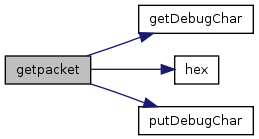

| void handle_exception | ( | int | exceptionVector ) |
Definition at line 834 of file i386-stub-win32.c.
References _returnFromException(), BREAKPOINT, BUFMAX, computeSignal(), debug_error(), EBP, ESP, gdb_i386vector, getpacket(), hex2mem(), hexToInt(), mem2hex(), NUMREGBYTES, NUMREGS, PC, PS, putpacket(), registers, remote_debug, and strcpy_s.
{
int sigval, stepping;
int addr, length;
char *ptr;
int newPC;
#ifndef WIN32 //MF
gdb_i386vector = exceptionVector;
#endif
if (remote_debug)
{
printf ("vector=%d, sr=0x%x, pc=0x%x\n",
exceptionVector, registers[PS], registers[PC]);
}
/* reply to host that an exception has occurred */
sigval = computeSignal (exceptionVector);
ptr = remcomOutBuffer;
*ptr++ = 'T'; /* notify gdb with signo, PC, FP and SP */
*ptr++ = hexchars[sigval >> 4];
*ptr++ = hexchars[sigval & 0xf];
*ptr++ = hexchars[ESP];
*ptr++ = ':';
ptr = mem2hex((char *)®isters[ESP], ptr, 4, 0); /* SP */
*ptr++ = ';';
*ptr++ = hexchars[EBP];
*ptr++ = ':';
ptr = mem2hex((char *)®isters[EBP], ptr, 4, 0); /* FP */
*ptr++ = ';';
*ptr++ = hexchars[PC];
*ptr++ = ':';
ptr = mem2hex((char *)®isters[PC], ptr, 4, 0); /* PC */
*ptr++ = ';';
*ptr = '\0';
putpacket (remcomOutBuffer);
stepping = 0;
while (1 == 1)
{
remcomOutBuffer[0] = 0;
ptr = getpacket ();
switch (*ptr++)
{
case '?':
remcomOutBuffer[0] = 'S';
remcomOutBuffer[1] = hexchars[sigval >> 4];
remcomOutBuffer[2] = hexchars[sigval % 16];
remcomOutBuffer[3] = 0;
break;
case 'd':
remote_debug = !(remote_debug); /* toggle debug flag */
break;
case 'g': /* return the value of the CPU registers */
mem2hex ((char *) registers, remcomOutBuffer, NUMREGBYTES, 0);
break;
case 'G': /* set the value of the CPU registers - return OK */
hex2mem (ptr, (char *) registers, NUMREGBYTES, 0);
strcpy_s(remcomOutBuffer, BUFMAX, "OK");
break;
case 'P': /* set the value of a single CPU register - return OK */
{
int regno;
if (hexToInt (&ptr, ®no) && *ptr++ == '=')
if (regno >= 0 && regno < NUMREGS)
{
hex2mem (ptr, (char *) ®isters[regno], 4, 0);
strcpy_s(remcomOutBuffer, BUFMAX, "OK");
break;
}
strcpy_s(remcomOutBuffer, BUFMAX, "E01");
break;
}
/* mAA..AA,LLLL Read LLLL bytes at address AA..AA */
case 'm':
/* TRY TO READ %x,%x. IF SUCCEED, SET PTR = 0 */
if (hexToInt (&ptr, &addr))
if (*(ptr++) == ',')
if (hexToInt (&ptr, &length))
{
ptr = 0;
mem_err = 0;
mem2hex ((char *) addr, remcomOutBuffer, length, 1);
if (mem_err)
{
strcpy_s(remcomOutBuffer, BUFMAX, "E03");
debug_error ("memory fault");
}
}
if (ptr)
{
strcpy_s(remcomOutBuffer, BUFMAX, "E01");
}
break;
/* MAA..AA,LLLL: Write LLLL bytes at address AA.AA return OK */
case 'M':
/* TRY TO READ '%x,%x:'. IF SUCCEED, SET PTR = 0 */
if (hexToInt (&ptr, &addr))
if (*(ptr++) == ',')
if (hexToInt (&ptr, &length))
if (*(ptr++) == ':')
{
mem_err = 0;
hex2mem (ptr, (char *) addr, length, 1);
if (mem_err)
{
strcpy_s(remcomOutBuffer, BUFMAX, "E03");
debug_error ("memory fault");
}
else
{
strcpy_s(remcomOutBuffer, BUFMAX, "OK");
}
ptr = 0;
}
if (ptr)
{
strcpy_s(remcomOutBuffer, BUFMAX, "E02");
}
break;
/* cAA..AA Continue at address AA..AA(optional) */
/* sAA..AA Step one instruction from AA..AA(optional) */
case 's':
stepping = 1;
case 'c':
/* try to read optional parameter, pc unchanged if no parm */
if (hexToInt (&ptr, &addr))
registers[PC] = addr;
newPC = registers[PC];
/* clear the trace bit */
registers[PS] &= 0xfffffeff;
/* set the trace bit if we're stepping */
if (stepping)
registers[PS] |= 0x100;
#ifdef WIN32 //MF
return;
#else
_returnFromException (); /* this is a jump */
#endif
break;
/* kill the program */
case 'k': /* do nothing */
#if 0
/* Huh? This doesn't look like "nothing".
m68k-stub.c and sparc-stub.c don't have it. */
BREAKPOINT ();
#endif
break;
} /* switch */
/* reply to the request */
putpacket (remcomOutBuffer);
}
}
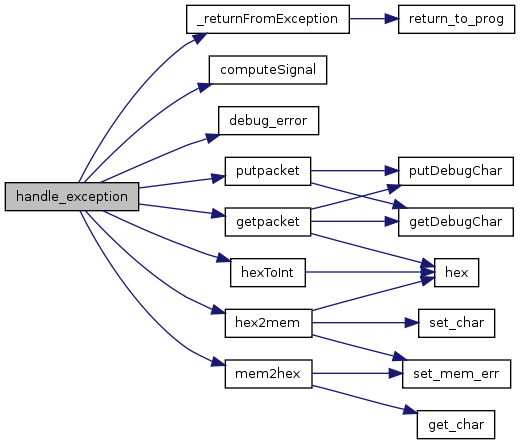
| int hex | ( | char | ch ) |
Definition at line 512 of file i386-stub-win32.c.
Referenced by getpacket(), hex2mem(), and hexToInt().
{
if ((ch >= 'a') && (ch <= 'f'))
return (ch - 'a' + 10);
if ((ch >= '0') && (ch <= '9'))
return (ch - '0');
if ((ch >= 'A') && (ch <= 'F'))
return (ch - 'A' + 10);
return (-1);
}
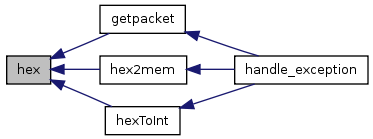
| char* hex2mem | ( | char * | buf, |
| char * | mem, | ||
| int | count, | ||
| int | may_fault | ||
| ) |
Definition at line 705 of file i386-stub-win32.c.
References hex(), set_char(), and set_mem_err().
Referenced by handle_exception().
{
int i;
unsigned char ch;
#ifdef WIN32 //MF
// MinGW does not support structured exception handling, so let's
// go safe and make memory writable by default
DWORD old_protect;
VirtualProtect(mem, count, PAGE_EXECUTE_READWRITE, &old_protect);
#else
if (may_fault)
mem_fault_routine = set_mem_err;
#endif
for (i = 0; i < count; i++)
{
ch = hex (*buf++) << 4;
ch = ch + hex (*buf++);
set_char (mem++, ch);
if (may_fault && mem_err)
return (mem);
}
#ifndef WIN32 //MF
if (may_fault)
mem_fault_routine = NULL;
#endif
return (mem);
}
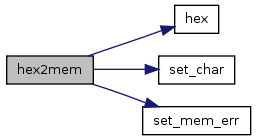

| int hexToInt | ( | char ** | ptr, |
| int * | intValue | ||
| ) |
Definition at line 806 of file i386-stub-win32.c.
References hex().
Referenced by handle_exception().
{
int numChars = 0;
int hexValue;
*intValue = 0;
while (**ptr)
{
hexValue = hex (**ptr);
if (hexValue >= 0)
{
*intValue = (*intValue << 4) | hexValue;
numChars++;
}
else
break;
(*ptr)++;
}
return (numChars);
}


| char* mem2hex | ( | char * | mem, |
| char * | buf, | ||
| int | count, | ||
| int | may_fault | ||
| ) |
Definition at line 670 of file i386-stub-win32.c.
References get_char(), and set_mem_err().
Referenced by handle_exception().
{
int i;
unsigned char ch;
#ifdef WIN32 //MF
if (IsBadReadPtr(mem, count))
return mem;
#else
if (may_fault)
mem_fault_routine = set_mem_err;
#endif
for (i = 0; i < count; i++)
{
ch = get_char (mem++);
if (may_fault && mem_err)
return (buf);
*buf++ = hexchars[ch >> 4];
*buf++ = hexchars[ch % 16];
}
*buf = 0;
#ifndef WIN32 //MF
if (may_fault)
mem_fault_routine = NULL;
#endif
return (buf);
}


| void putDebugChar | ( | ) |
| void putpacket | ( | char * | buffer ) |
Definition at line 602 of file i386-stub-win32.c.
References getDebugChar(), and putDebugChar().
Referenced by handle_exception().
{
unsigned char checksum;
int count;
char ch;
/* $<packet info>#<checksum>. */
do
{
putDebugChar ('$');
checksum = 0;
count = 0;
while ((ch = buffer[count]) != 0)
{
putDebugChar (ch);
checksum += ch;
count += 1;
}
putDebugChar ('#');
putDebugChar (hexchars[checksum >> 4]);
putDebugChar (hexchars[checksum % 16]);
}
while (getDebugChar () != '+');
}


| void return_to_prog | ( | ) |
| void set_char | ( | char * | addr, |
| int | val | ||
| ) |
Definition at line 660 of file i386-stub-win32.c.
Referenced by hex2mem().
{
*addr = val;
}

| void set_debug_traps | ( | void | ) |
Definition at line 1015 of file i386-stub-win32.c.
References _catchException0(), _catchException1(), _catchException10(), _catchException11(), _catchException12(), _catchException13(), _catchException14(), _catchException16(), _catchException3(), _catchException4(), _catchException5(), _catchException6(), _catchException7(), _catchException8(), _catchException9(), exceptionHandler(), remcomStack, and STACKSIZE.
{
#ifndef WIN32 //MF
stackPtr = &remcomStack[STACKSIZE / sizeof (int) - 1];
exceptionHandler (0, _catchException0);
exceptionHandler (1, _catchException1);
exceptionHandler (3, _catchException3);
exceptionHandler (4, _catchException4);
exceptionHandler (5, _catchException5);
exceptionHandler (6, _catchException6);
exceptionHandler (7, _catchException7);
exceptionHandler (8, _catchException8);
exceptionHandler (9, _catchException9);
exceptionHandler (10, _catchException10);
exceptionHandler (11, _catchException11);
exceptionHandler (12, _catchException12);
exceptionHandler (13, _catchException13);
exceptionHandler (14, _catchException14);
exceptionHandler (16, _catchException16);
#endif // WIN32
initialized = 1;
}
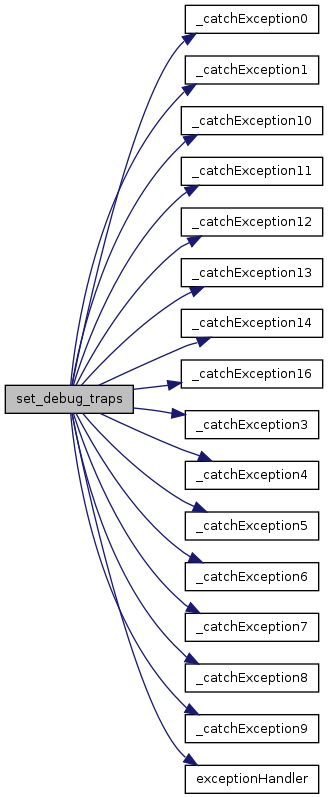
| void set_mem_err | ( | void | ) |
Definition at line 644 of file i386-stub-win32.c.
Referenced by hex2mem(), and mem2hex().
{
mem_err = 1;
}

Variable Documentation
| int gdb_i386errcode |
Definition at line 184 of file i386-stub-win32.c.
| int gdb_i386vector = -1 |
Definition at line 187 of file i386-stub-win32.c.
Referenced by handle_exception().
| int registers[NUMREGS] |
Definition at line 132 of file i386-stub-win32.c.
Referenced by handle_exception().
| int remcomStack[STACKSIZE/sizeof(int)] |
Definition at line 137 of file i386-stub-win32.c.
Referenced by set_debug_traps().
| int remote_debug |
Definition at line 113 of file i386-stub-win32.c.
Referenced by debug_error(), getpacket(), and handle_exception().



















